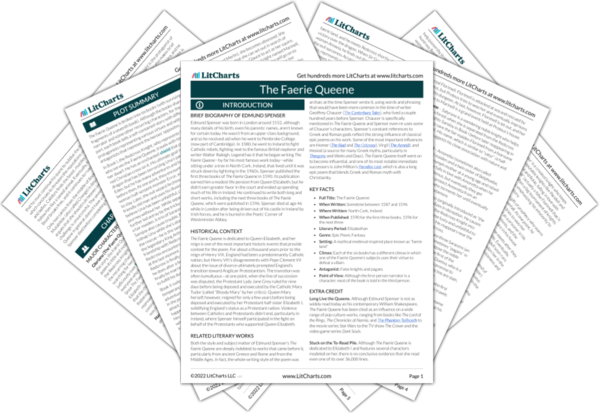Throughout Edmund Spenser’s The Faerie Queene, there are two types of relationships that occur again and again. One is love (typically between a knight and a lady) and the other is friendship (often between equally matched knights who share common goals, or between knights and squires). In Spenser’s epic poem, characters’ morality often comes through most clearly in their relationships with others, meaning that heroic characters are kind and courteous in their relationships while villainous characters are selfish and uncaring.
One of the most noteworthy love stories in The Fairy Queene is the romance between Britomart and Arthegall. Though their courtship represents an ideal version of love, this doesn’t mean there aren’t obstacles along the way. First, Britomart searches for a long time for Arthegall, enduring heartsickness and maintaining her chastity, all in the hopes of one day meeting her destined husband. After meeting, Britomart and Arthegall don’t immediately fall in love—due to mistaken identity, the two end up actually fighting each other in battle. Even when Britomart and Arthegall do confess their love, they can’t be together immediately because Arthegall is called off to complete his knightly duties. Though there are fairytale elements to the love between Britomart and Arthegall, what’s even more noteworthy is their patience and endurance for overcoming obstacles.
In a similar vein, many of the noble knights that meet in The Faerie Queene also form enduring friendships that are built on sacrifice and endurance. Arthur appears as a character in several books, helping the other knights on their quests, but his most notable relationship is with his squire Timias. Timias and Arthur feel affection for each other, but they also feel a sense of duty. When Timias fails in his squirely duty by disappointing the fair huntress Belphoebe, he is too ashamed to see Arthur again until he first performs proper penance to Belphoebe. In the poem, knights operate according to a code, and while knights who follow this code form friendships based on shared duty, knights who disregard the code often end up on their own, at least until they serve their punishment. By comparing and contrasting examples of love and friendship in The Faerie Queene, Spenser shows how healthy relationships can be based on mutual duty and sacrifice, while superficial relationships can be easily torn apart by greed and selfishness.
Love and Friendship ThemeTracker

Love and Friendship Quotes in The Faerie Queene
Come, come away, fraile, feeble, fleshly wight,
Ne let vaine words bewitch thy manly hart,
Ne divelish thoughts dismay thy constant spright.
Said Guyon, See the mind of beastly man,
That hath so soone forgot the excellence
Of his creation, when he life began,
That now he chooseth, with vile difference
To be a beast, and lack intelligence
The man whom Heavens have ordaynd to bee
The spouse of Britomart, is Arthegall:
He wonneth in the land of Fayeree
Who through foresight of his eternall skill,
Bad her from womankind to keepe him well:
For of a woman he should have much ill,
A virgin strange and stout him should dismay, or kill.
Now when the Beast, which by her wicked art
Late forth she sent, she backe returning spyde,
Tyde with her broken girdle, it a part
Of her rich spoyles, whom he had earst destroyd,
She weend, and woundrous gladnesse to her hart applyde.
But Britomart uprearing her from ground,
Said, Gentle Dame, reward enough I weene
For many labours more, then I have found,
This, that in safety now I have you seen,
And meane of your deliverance have beene
Of lovers sad calamities of old,
Full many piteous stories doe remaine,
But none more piteous ever was ytold,
Then that of Amorets hart-binding chaine,
And this of Florimels unworthie paine
Though now their acts be no where to be found
As that renowned Poet them compyled,
With warlike numbers and Heroicke sound,
Dan Chaucer well of English undefiled,
On Fames eternall beadroll worthie to be fyled.
Then all with one consent did yield the prize
To Triamond and Cambell as the best.
But Triamond to Cambell it relest.
And Cambell it to Triamond transferd;
Each labouring t’advance the others gest,
And make his praise before his owne preferd:
Then was that golden belt by doome of all
Graunted to her, as to the fairest Dame.
Which being brought, about her middle small
They thought to gird, as best it her became;
But by no meanes they could it thereto frame.
Right so himself did Marinell upreare,
When he in place his dearst love did spy;
And though his limbs could not his bodie beare,
Ne former strength return so suddenly,
Yet chearefull signes he shewed outwardly.
And such was he, of whome I have to tell,
The Champion of true Justice Artegall.
Whom (as ye lately mote remember well)
An hard adventure, which did then befall,
Into redoubted perill forth did call.
Where being layd, the wrothfull Britonesse
Stayd not, till she came to her selfe againe,
But in revenge both of her loves distresse,
And her late vile reproach, though vaunted vaine,
And also of her wound, which sore did paine,
She with one stroke both head and helmet cleft.
When they had seene and heard her doome a rights
Against Duessa, damned by them all;
But by her tempred without griefe or gall,
Till strong constraint did her thereto enforce.
So there that night Sir Calidore did dwell,
And long while after, whilest him list remaine,
Dayly beholding the faire Pastorell,
And feeding on the bayt of his owne bane.
During which time he did her entertaine
With all kind courtesies, he could invent;
And every day, her companiee to gaine











